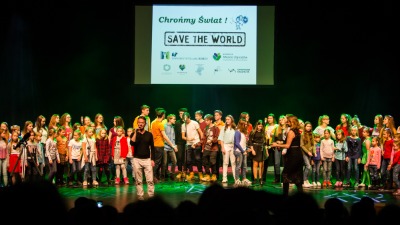Let's save the world!
- Poland,Katowice in Silesia Region
- 2018

| Time frame | |
| Categories | |
| Level of Schools | |
| External Partners | |
| Type of Schools | |
| URL | |
| Number of Schools involved | |
| Number of Schoolheads involved | |
| Number of Teachers involved | |
| Number of Students involved | |
| Number of Parents involved | |
| Number of External Partners involved |
The project “Let's save the world!” aimed to support and disseminate the ideas of the UN Convention on Climate Change COP 24 in schools during the Convention deliberations in Katowice and to shape cognitive, pro-ecological and pro-social attitudes among pupils. The event combined a theatrical performance and ballet by children with songs and performances by local and well-known European artists. Furthermore, scientific lectures and concerts of children's and youth choirs were offered. The event was free of charge for one thousand school students from primary and lower secondary schools of the Silesia region.
The aim was to support and disseminate in schools the ideas of the UN Convention on Climate Change COP 24 in Katowice during the Convention deliberations and to shape cognitive, pro-ecological and pro-social attitudes among pupils.
We have combined theatrical performance and ballet performed by children with songs and performances by local and well-known European artists as well as with scientific lectures and concerts of children's and youth choirs and offered the event free for one thousand school students from primary and lower secondary schools of the Silesia region.
By the funds of the Children's University of Silesia and voluntary work and rentals for the project.
Involvement of local school communities in current world and European problems,
establishing cooperation between the university, educational and city authorities and cultural institutions for the benefit of school environments,
encouraging children to actively respond to social problems.
The project showed enormous opportunities arising from the combination of university potential, city authorities, educational authorities, cultural institutions and international organizations that could be used to benefit all children in the region.
It raised awareness of the need and strength of active involvement in solving social and economic problems.
Encouraging all children to react actively to social problems, team cooperation and organizing inter-school happenings.
Arts - theatrical performance, ballet, choir concerts
Science - lecture on the climate and the conditions of planet Earth, lecture on astronomy
Social - happening demanding clean air, engaged songs
astronomy and climatology with social commitment, arts and literature - Little Prince by Antoine de Saint- Exupéry
Cooperation of University of Silesia, Katowice Miasto Ogrodów - cultural institution, The Education Office in Silesia, City hall of Katowice, Silesian Planetarium, Theater Bonn, Save the World, Dziennik Zachodni - newspaper, National Music School in Katowice, Youth Cultural Center in Dąbrowa Górnicza, Children's Academy of Theater and Dancing
and active participation of about 110 children and youths to prepare the project for 1000 peers from other schools
High air and the environmental pollution related to the history of heavy industry and coal mining in Silesia region
An example of grassroots social response and pressure on politicians, authorities and ruling teams.
The common aim consolidated and made perfect the cooperation between all the engaged institutions, authorities and partners with Children's University of Silesia as the leader.
organization and management of the event, support of technical means, technicians and the main auditorium with 1000 seats, patronage, promotion and dissemination of ideas of the project, organizing lectures, three children and youth choirs, ballet ensemble, foreign artists, musicians and volunteers
The project showed enormous opportunities arising from the cooperation and joining the possibilities and potentials of university potential, city authorities, educational authorities, cultural institutions and international organizations that could be used to benefit all children in the region.
